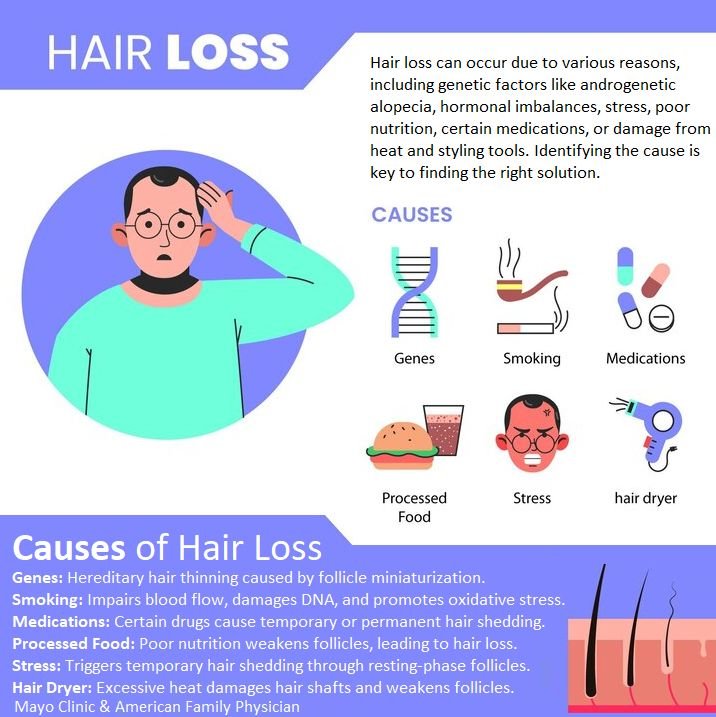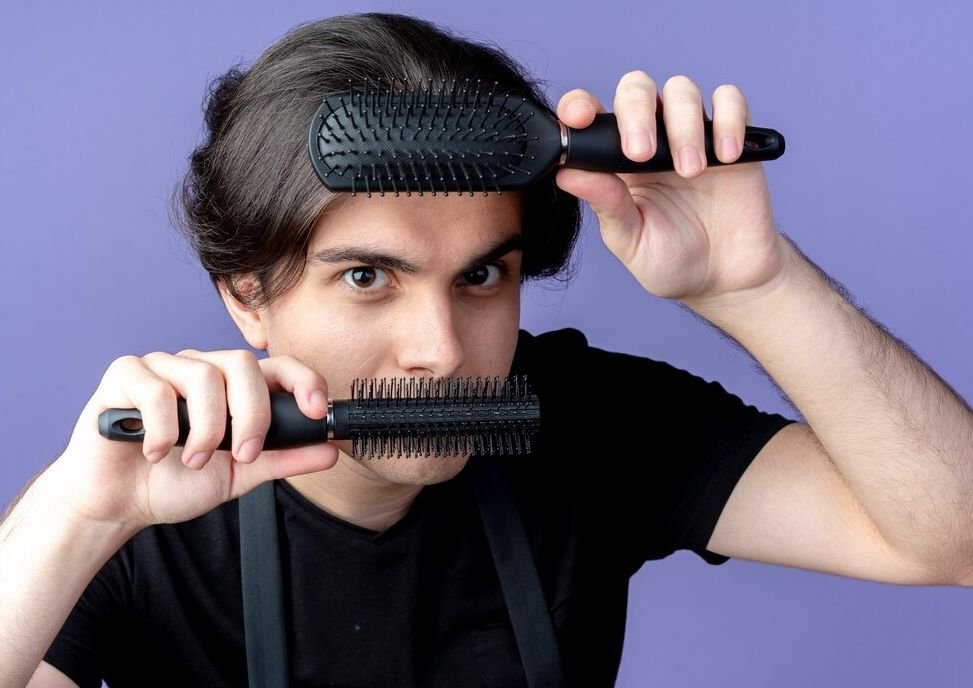Why Are You Losing Your Hair?
Hair loss, medically referred to as alopecia, is a common concern that can affect individuals of all ages and genders. Understanding the underlying causes is essential for addressing this issue effectively. Below, we explore the top 10 reasons for hair loss, supported by scientific insights.


Here Are the Top 10 Reasons
- Androgenetic Alopecia (Genetic Hair Loss)
Androgenetic alopecia, also known as male-pattern or female-pattern baldness, is the most common cause of hair loss. It is hereditary and influenced by hormones called androgens, particularly dihydrotestosterone (DHT). This condition typically results in a receding hairline and thinning at the crown in men, while women experience diffuse thinning across the scalp¹⁻³.
- Telogen Effluvium (Stress-Induced Hair Loss)
Telogen effluvium occurs when a significant number of hair follicles prematurely enter the resting (telogen) phase of the hair growth cycle. This condition can be triggered by physical or emotional stressors such as childbirth, surgery, illness, or extreme weight loss. Hair shedding usually begins 2–4 months after the triggering event and can last up to six months⁴⁻⁵.
- Hormonal Imbalances
Hormonal fluctuations due to pregnancy, menopause, thyroid disorders, or conditions like polycystic ovary syndrome (PCOS) can disrupt the hair growth cycle. For instance, postpartum women often experience temporary hair shedding due to hormonal changes after childbirth⁶⁻⁷.
- Nutritional Deficiencies
A lack of essential nutrients such as iron, zinc, biotin, and vitamin D can lead to hair thinning or shedding. Extreme diets or eating disorders can exacerbate this issue. Ensuring a balanced diet rich in these nutrients is critical for maintaining healthy hair⁸⁻¹⁰.
- Autoimmune Conditions
Autoimmune diseases like alopecia areata cause the immune system to attack hair follicles, leading to patchy hair loss on the scalp or body. Severe forms include alopecia totalis (complete scalp hair loss) and alopecia universalis (loss of all body hair)¹¹.
- Excessive Hair Care Practices
Frequent use of heat-styling tools, chemical treatments (e.g., bleaching), and tight hairstyles like braids or ponytails can damage hair follicles over time. This may result in traction alopecia—a form of hair loss caused by prolonged tension on the scalp¹²⁻¹³.
- Medical Conditions and Medications
Certain medical conditions such as diabetes, lupus, and hypothyroidism can contribute to hair loss. Additionally, medications for cancer (chemotherapy), high blood pressure, depression, or birth control pills may list hair shedding as a side effect¹⁴⁻¹⁵.
- Scalp Infections
Fungal infections like tinea capitis (scalp ringworm) or bacterial infections such as folliculitis can weaken hair follicles and lead to temporary or permanent hair loss if untreated¹⁶.
- Aging
As part of the natural aging process, many individuals experience gradual thinning of their hair due to a condition called involutional alopecia. This occurs as more follicles shift from the growth (anagen) phase into the resting (telogen) phase over time¹⁷.
- Stress and Emotional Factors
Chronic stress increases cortisol levels in the body, which can disrupt the normal functioning of hair follicles. Stress-related conditions like trichotillomania (hair-pulling disorder) also contribute to noticeable hair thinning or bald patches¹⁸.


Conclusion
Hair loss can stem from a variety of causes ranging from genetics and hormonal imbalances to lifestyle factors and medical conditions. Identifying the root cause is key to determining an effective treatment strategy—whether it involves dietary adjustments, stress management techniques, or medical interventions such as topical treatments or advanced therapies like platelet-rich plasma (PRP). If you are experiencing persistent or unexplained hair loss, consulting a dermatologist or trichologist is highly recommended.
References
- MedlinePlus Genetics. Androgenetic alopecia: Causes and inheritance patterns [Internet]. Available from: https://medlineplus.gov/genetics/condition/androgenetic-alopecia/
- Mayo Clinic Staff. Hair loss – Symptoms and causes [Internet]. Mayo Clinic; 2024.
- Pure Hair Restoration Blog. Top 10 Causes of Hair Loss [Internet]. 2023.
- HealthHero Blog. 8 Reasons for Hair Loss in Women [Internet]. 2024.
- Wikipedia Contributors. Telogen effluvium [Internet]. Wikipedia; 2024.
- Medical News Today Staff. Why is my hair falling out? 10 causes of hair loss [Internet]. 2024.
- LloydsPharmacy Online Doctor UK Blog. Hormonal changes and their impact on hair health [Internet].
- Trüeb RM et al., The role of nutrition in maintaining healthy hair growth [Internet]. Dermatol Pract Concept; 2015.
- MedPark Hospital Blog. Nutritional deficiencies contributing to alopecia [Internet].
- PMC Article: Genetic aspects of alopecia [Internet]. National Library of Medicine; 2022.
- Mayo Clinic Staff. Alopecia areata – Causes and symptoms [Internet].
- HealthHero Blog. Impact of excessive styling on scalp health [Internet].
- Pure Hair Restoration Blog: Traction alopecia explained [Internet].
- LloydsPharmacy Online Doctor UK Blog: Medication-induced alopecia [Internet].
- MedPark Hospital Blog: Medical conditions linked with hair thinning [Internet].
- Wikipedia Contributors: Scalp infections causing alopecia [Internet].
- Mayo Clinic Staff: Aging-related involutional alopecia [Internet].
- Medical News Today Staff: Stress-induced cortisol effects on follicular health [Internet].
Blog
Alcohol and Hair Loss: Unveiling the Connection
Alcohol and Hair Loss: Unveiling the LinkHair loss is a widespread issue that affects millions of people globally, causing significant emotional and psychological distress. While genetic predisposition, hormonal changes, and medical conditions are well-established...
Can Red Light Therapy Reverse Hair Loss? A Scientific Perspective
Can Red Light Therapy Reverse Hair Loss? A Scientific PerspectiveHair loss is a widespread concern, affecting individuals across genders and age groups. With advancements in non-invasive treatments, red light therapy (RLT), also known as low-level laser therapy...
Your Needs, Our Solutions: Addressing Hair Loss with Cure & Travel
Your Needs, Our Solutions: Addressing Hair Loss with Cure & Travel Hair loss can be a distressing experience for many people, whether it's due to environmental factors, lifestyle choices, or genetics. At Cure & Travel, based in London, we understand the...
Blog
Alcohol and Hair Loss: Unveiling the Connection
Alcohol and Hair Loss: Unveiling the LinkHair loss is a widespread issue that affects millions of people globally, causing significant emotional and psychological distress. While genetic predisposition, hormonal changes, and medical conditions are well-established...
Can Red Light Therapy Reverse Hair Loss? A Scientific Perspective
Can Red Light Therapy Reverse Hair Loss? A Scientific PerspectiveHair loss is a widespread concern, affecting individuals across genders and age groups. With advancements in non-invasive treatments, red light therapy (RLT), also known as low-level laser therapy...
Your Needs, Our Solutions: Addressing Hair Loss with Cure & Travel
Your Needs, Our Solutions: Addressing Hair Loss with Cure & Travel Hair loss can be a distressing experience for many people, whether it's due to environmental factors, lifestyle choices, or genetics. At Cure & Travel, based in London, we understand the...






